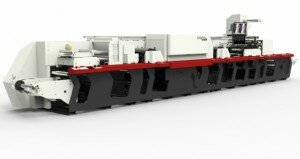Amcor spinoff Orora has made a $104.4m pro forma net profit in its first financial year report since the demerger.
Orora managing director and CEO Nigel Garrard says the business has achieved ‘pleasing results’ across all metrics in its first months as an independent company, despite tough conditions in Australia.
He says, “In our first year we have delivered on what we said we were going to do. We have successfully closed and restructured the business. The results were underpinned by strong costs-out and efficiency programmes.
“We have seen the benefits from our investment and our restructuring flow to both our bottom line and the cash in the business.”

Nigel Garrard, managing director and CEO of Amcor
Sales revenue rose 7.9 per cent to A$3,176.1bn on a constant currency basis, with sales up 3.5 per cent. Pro forma earnings before interest and tax climbed 29.6 per cent to A$192.1m and operating cash flow hit A$224.1m, up from A$168.9m.
As the demerger was finalised in December last year, Orora has used pro forma figures, which it says reflect 12 months of operating results in its current structure.
In statutory results it made a net loss of A$106.5m, including significant items of A$181.6m. Net profit after tax, before significant items, was A$75.1m.
Garrard says economic conditions have been ‘fairly benign’ in Australia, New Zealand and North America, where the company manufactures and supplies corrugated boxes, folding cartons, recycled paper linerboard, glass bottles and jars, paper sacks, closures, aluminium cans and bulk bags.
New Zealand is currently outperforming the Australian business thanks to tougher market conditions, while Garrard says North America is remaining ‘stubbornly neutral.’
He says, “Business conditions in Australia are tough. There is a lot of focus on costs and efficiency throughout the Australian economy, we are no different.
“I do not expect that to change in the coming year; it means you need to be on top of your game, invest for efficiency and make sure that your cost base is right.”
The Australasian operations saw a 25.7 per cent increase in pro forma EBIT to A$162.5m. In beverages the company gained market share in the glass division, while volume in cans was stable.
The region’s fibre segment generated increased earnings, Orora says thanks to cost reductions and footprint rationalisation. In total the company managed to save A$27.1m from cost reduction programmes.

Orora’s B9 paper mill generates recycled paper from Sydney waste. The company says the paper’s strength and printability is better than expected and is being well received by customers in Australasia and North America
The B9 recycled paper mill in Sydney’s Botany, a $500m investment for Amcor included in the Orora portfolio since the demerger, brought in just A$3m this year, but Garrard says it will continue on a ramp-up period of two to three years.
The mill produced 335,000 tonnes of recycled paper during the year with export commencing to Orora North America in January.
The chief executive says the company will continue to implement its cost-out and cost reduction programme, having generated around A$39m of savings towards a target of $93m.
The group is set to make its first bolt-on acquisition of a small plastics business in North America to supply food customers in the region, but Garrard says Orora will continue with strong financial discipline.
He says, “You need to earn the right to do bolt-ons. For us, cost reductions and delivering on B9 are priority number one, but as the business generates cash we have to look at how to deploy that.
“We have strong 20 per cent return hurdles, similar to that used by Amcor. Bolt-ons will be part of our strategy as we go forward. Our first priority will be in the markets in which we operate, in Australia, New Zealand and North America.”
He adds that the company will not go after market share for its own sake, with Visy a major competitor and Oji to acquire Carter Holt Harvey’s pulp, paper and packaging businesses by the end of 2014.
He says, “At the end of the day you do not bank market share. We will look at appropriate growth where we have innovation and where we think we have a competitive advantage. The last thing we want is profitless growth.”
GO TO MORE PACKAGING NEWS Print News | Packaging News | Wide Format news | Print | i-grafix | Australia, New Zealand and Asia Print and Packaging news from Australia, New Zealand and Asia
Print News | Packaging News | Wide Format news | Print | i-grafix | Australia, New Zealand and Asia Print and Packaging news from Australia, New Zealand and Asia

